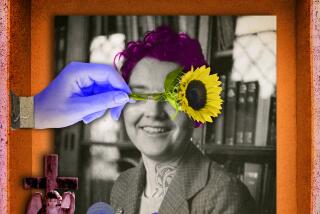FICTION
- Share via
AFTERWARDS by Amy Bartlett (Persea: $7.95, paperback). This first collection of poems identifies itself unmistakably as a first collection--there are breathy lapses in momentum and moments of stylistic confusion--but the poet’s effects are cumulative and give rise ultimately to a fine elegiac tone, an atmosphere of grave beauty. The title, “Afterwards,” is apt. Nearly all the poems here take place in a present manipulated by an emblematic past. Everything has already happened as the poem is written: Now is significantly diminished by Then; Now is a world indirectly lighted through a half-open door to the past. The words child, children and childhood occur 20 times in 30 poems. She endows the lost state of childhood with the illusion of being recoverable, as a religious illusion of innocence or state of grace is recoverable through ritual. One will gain access to this lost Eden if one moves closer to nature, listens to the words of the dying, the old, touches the bodies of the grieving. She is a mourner, but the poems are not mournful. Her mourning is alive, acute and generous. She says, a heartbroken ally of a widowed sister, “I always faced her/and paid attention to what I imagined she felt.” In the elegant lyric “Elegy,” she struggles to identify with the “being” of an infant who dies at 3 months:
I remember his perfection, the perfection God gives, of God’s eyes--
consciousness looking out at me--
The poem ends with someone who sits at the end of a long corridor reading a small book. The “small book” is the epitome of the lonely hospital vigil and poetry, our only access to a transformational past.
More to Read
Sign up for our Book Club newsletter
Get the latest news, events and more from the Los Angeles Times Book Club, and help us get L.A. reading and talking.
You may occasionally receive promotional content from the Los Angeles Times.










